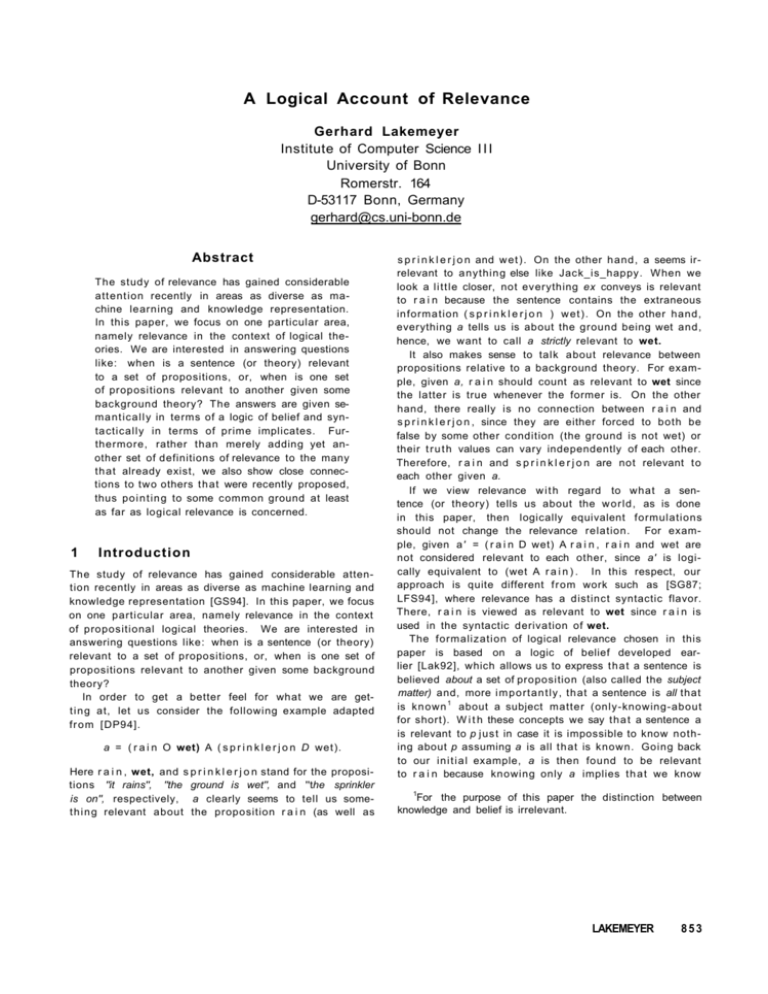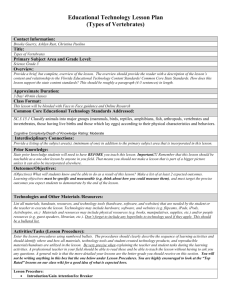A Logical Account of Relevance
advertisement

A Logical Account of Relevance Gerhard Lakemeyer Institute of Computer Science I I I University of Bonn Romerstr. 164 D-53117 Bonn, Germany gerhard@cs.uni-bonn.de Abstract The study of relevance has gained considerable attention recently in areas as diverse as machine learning and knowledge representation. In this paper, we focus on one particular area, namely relevance in the context of logical theories. We are interested in answering questions like: when is a sentence (or theory) relevant to a set of propositions, or, when is one set of propositions relevant to another given some background theory? The answers are given semantically in terms of a logic of belief and syntactically in terms of prime implicates. Furthermore, rather than merely adding yet another set of definitions of relevance to the many that already exist, we also show close connections to two others that were recently proposed, thus pointing to some common ground at least as far as logical relevance is concerned. 1 Introduction The study of relevance has gained considerable attention recently in areas as diverse as machine learning and knowledge representation [GS94]. In this paper, we focus on one particular area, namely relevance in the context of propositional logical theories. We are interested in answering questions like: when is a sentence (or theory) relevant to a set of propositions, or, when is one set of propositions relevant to another given some background theory? In order to get a better feel for what we are gett i n g at, let us consider the following example adapted f r o m [DP94]. a = ( r a i n O wet) A ( s p r i n k l e r j o n D wet). Here r a i n , wet, and s p r i n k l e r j o n stand for the propositions "it rains", "the ground is wet", and ''the sprinkler is on", respectively, a clearly seems to tell us somet h i n g relevant about the proposition r a i n (as well as s p r i n k l e r j o n and wet). On the other hand, a seems irrelevant to anything else like Jack_is_happy. When we look a little closer, not everything ex conveys is relevant to r a i n because the sentence contains the extraneous information ( s p r i n k l e r j o n ) wet). On the other hand, everything a tells us is about the ground being wet and, hence, we want to call a strictly relevant to wet. It also makes sense to talk about relevance between propositions relative to a background theory. For example, given a, r a i n should count as relevant to wet since the latter is true whenever the former is. On the other hand, there really is no connection between r a i n and s p r i n k l e r j o n , since they are either forced to both be false by some other condition (the ground is not wet) or their t r u t h values can vary independently of each other. Therefore, r a i n and s p r i n k l e r j o n are not relevant to each other given a. If we view relevance w i t h regard to what a sentence (or theory) tells us about the world, as is done in this paper, then logically equivalent formulations should not change the relevance relation. For example, given a' = ( r a i n D wet) A r a i n , r a i n and wet are not considered relevant to each other, since a' is logically equivalent to (wet A r a i n ) . In this respect, our approach is quite different from work such as [SG87; LFS94], where relevance has a distinct syntactic flavor. There, r a i n is viewed as relevant to wet since r a i n is used in the syntactic derivation of wet. The formalization of logical relevance chosen in this paper is based on a logic of belief developed earlier [Lak92], which allows us to express t h a t a sentence is believed about a set of proposition (also called the subject matter) and, more importantly, that a sentence is all that is known 1 about a subject matter (only-knowing-about for short). W i t h these concepts we say t h a t a sentence a is relevant to p just in case it is impossible to know nothing about p assuming a is all that is known. Going back to our i n i t i a l example, a is then found to be relevant to r a i n because knowing only a implies t h a t we know 1 For the purpose of this paper the distinction between knowledge and belief is irrelevant. LAKEMEYER 853 something nontrivial about r a i n , namely ( r a i n _ wet). Note the importance of assuming that only a is believed and nothing else. For if we merely require a to be believed, we do not rule out believing wet as well, in which case wet reduces to wet and all relevance to r a i n disappears. Given a logic of only-knowing-about, it is perhaps not surprising t h a t we are able to express this f o r m of relevance in such a direct manner, since the logic has a builtin p r i m i t i v e notion of relevance in the sense of aboutness. It is perhaps more interesting t h a t this p r i m i t i v e notion suffices to provide a reasonable semantics to other varieties of relevance as well. For instance, r a i n is relevant to wet relative to a because what is known about r a i n , viewed as a sentence, is relevant to wet. Besides defining various forms of relevance sernantically in terms of only-knowing-about, we also provide syntactic characterizations in terms of prime i m plicates in each case. Furthermore, rather than merely adding yet another set of definitions of relevance to the many t h a t already exist, we also show close connections to two others t h a t were recently proposed [DP94; LR94], thus p o i n t i n g to some common ground at least as far as logical relevance is concerned. T h e rest of the paper is organized as follows. In Section 2, we define the semantics of only-knowing-about, which is a variant of the semantics presented in [Lak92]. Section 3 contains our various definitions of relevance using the logic of the previous section. In Sections 4 and 5, we compare our work to that of Darwiche and Pearl on the one hand and L i n and Reiter on the other. We end the paper w i t h a summary and some concluding remarks. 2 T h e Logic of Only-Knowing-About The logic of only-knowing-about, which was originally introduced in [Lak92], extends earlier work by Levesque [Lev90], who formalized what it means to only know a sentence, which can be thought of as the limit-case of only-knowing-about, where the subject matter includes everything the agent has any information about. T h e semantic framework for all these i n vestigations is possible-world semantics HM92]. 2.1 From Only-Knowing to Only-Knowing-About Before introducing the semantics for "all the agent knows about x is y," we start out w i t h the simpler case of Levesque's only-knowing. There an agent knows a sentence a, denoted as L a , j u s t in case a is true in all the worlds which the agent thinks are possible (or accessible). The reader should t h i n k of a world simply as a t r u t h assignment for the atomic propositions. (Formal definitions are deferred to Section 2.3 below.) To define only-knowing, Levesque considers another m o d a l i t y N, 854 KNOWLEDGE REPRESENTATION where Na means t h a t a is true in all the impossible (or inaccessible) worlds. 2 W h i l e is best understood as "the agent knows at least t h a t is t r u e , " Na should be read as "the agent knows at most " W i t h that onlyknowing , denoted as , reduces to knowing at least and at most , that is, holds j u s t in case b o t h and hold. Let us now consider how to extend these ideas to i n clude a subject matter. Since we confine ourselves to propositional logic, we define a subject matter as a finite set of atomic propositions. For each such we introduce new modal operators and , where 4 , is read as "the agent knows at least about ," as "the agent knows at most t h a t _. is false about ..," and as "all the agent knows about is " As in the case of only-knowing, can be viewed as shorthand for As for the semantics of these modalities, suppose the beliefs of the agent are given by the set of worlds M the agent thinks possible. To find out what the agent knows about we construct a set of worlds which, i n t u itively, represents what the agent knows after forgetting everything that is not relevant to W i t h t h a t the operators and are interpreted j u s t like L , N , and O except that we are using instead of M. For example, an agent believes a about p a t a set of worlds M j u s t in case she believes a at The logic is a slight variant of the one presented in [Lak92j. In particular, we ignore nested modalities, which are not essential for our purposes. The operators and were not used in the previous version of the logic. 2.2 T h e Language and O t h e r N o t a t i o n The primitives of the language are a countably infinite set V of atomic propositions (or atoms), the connectives and the modal operators L , N , 0 , , and for every every finite set of atomic propositions w i t h the restriction t h a t none of the modal operators occurs w i t h i n the scope of another modal operator. Sentences are formed in the usual way f r o m these primitives. 3 N o t a t i o n : As usual, literals are either atoms or negated atoms and clauses are disjunctions of literals. We write f a l s e as an abbreviation for , where p is some a t o m , and t r u e for - " f a l s e . Given an atomic proposition p and and a clause c, we say t h a t c mentions p j u s t in case either p or . occurs in c. It is often convenient to identify a clause w i t h the set of literals occurring in the clause. A clause c is contained in a clause c' if every literal in c occurs in c'. 2 Note that here impossible does not mean that these worlds are logically impossible. They are merely incompatible with the agent's knowledge. 3 We will freely use other connectives like and which should be understood as syntactic abbreviations of the usual kind. LAKEMEYER 855 886 KNOWLEDGE REPRESENTATION LAKEMEYER 857 868 KNOWLEDGE REPRESENTATION [DP94] Darwiche, A. and Pearl, J., Symbolic Causal Networks, in Proc. AAAI-94, AAAI-Press, 1994, pp. 238-244. [deK86] de Kleer, J., An assumption-based TMS. Artificial Intelligence, 28(2), 1986, pp. 127-162. [GS94] Greiner, R. and Subramaniam, D. (Eds.), Proceedings of the A A A I Fall Symposium on Relevance, New Orleans, 1994. [HM92] Halpern, J. Y. and Moses, Y. O., A Guide to completeness and complexity for modal logics of knowledge and belief, Artificial Intelligence, 54, pp. 319379, 1992. [Hin62] Hintikka, J., Knowledge and Belief: An Introduction to the Logic of the Two Notions. Cornell University Press, 1962. [Kri63] Kripke, S. A., Semantical considerations on modal logic. Acta Philosophica Fennica 16, 1963, pp. 8394. [Lak92] Lakemeyer, G., All You ever Wanted to Know about Tweety, in Proc. of the 3rd International Conference on Principles of Knowledge Representation and Reasoning (KR'92), Morgan Kaufmann, San Mateo, CA, 1992, pp. 639-648. 6 Conclusion In this paper we proposed various definitions of relevance w i t h i n a logic of only-knowing-about. We showed that the semantic definitions have simple characterizations in terms of prime implicates. Furthermore, we demonstrated tight connections between our work and that of Darwiche and Pearl on the one hand and Lin and Reiter on the other. W h i l e all three approaches evolved independently w i t h different motivations in m i n d , this paper suggests that there is common ground among them. However, more work is needed to map out their exact relationships. In future work, our investigations of logical relevance should be extended to the first-order case, which would require a first-order version of the logic of only-knowingabout. This would allow an even better comparison w i t h LR's work, which is already first-order. Judging from LR's experience, though, there may well be nasty surprises along the way. For example, the result of forgetting a predicate the LR way is not always first-order representable. A cknowledgement s I would like to thank Adrian Darwiche, Adam Grove, Fangzhen Lin, and Ray Reiter for discussions, which helped clarify many ideas presented in this paper. 1 am also grateful to the anonymous referees, whose suggestions helped to improve the presentation of the paper. References [Dar94] Darwiche, A., A logical notion of conditional independence: properties and applications, in Proc. of the AAAI Fall Symposium on Relevance, New Orleans, 1994, pp. 36-40. [Lak93] Lakemeyer, G., All They Know About, Proc. of the 11th National Conference on Artificial Intelligence (AAAI-93), M I T Press, Cambridge, MA, 1993, pp. 662-667. [Lak94] Lakemeyer, G., Relevance in a Logic of Only Knowing About and its Axiomatization, in Proc. of the AAAI Fall Symposium on Relevance, New Orleans, 1994, pp. 149-153. [Lak95] Lakemeyer, G., Relevance in a Logic of OnlyKnowing-About and its Axiomatization, to appear in: A. Laux and H. Wansing (eds.) Knowledge and Belief in Philosophy and Artificial Intelligence, Akademie-Verlag, Berlin, 1995. [Lev90] Levesque, H. J., All I Know: A Study in Autoepistemic Logic. Artificial Intelligence, North Holland, 42, 1990, pp. 263-309. [LFS94] Levy, A., Fikes, R., and Sagiv, Y., A ProofTheoretic Approach to Irrelevance: Foundations and Applications, in Proc. of the AAAI Fall Symposium on Relevance, New Orleans, 1994, pp. 149-153. [LR94] Lin, Fangzhen and Reiter, R., Forget It!, in Proc. of the AAAI Fall Symposium on Relevance, New Orleans, 1994, pp. 154-159. [Pea88] Pearl, J., Probabilistic Reasoning in Intelligent Systems: Networks of Plausible Inference. Morgan Kaufmann Publishers, San Francisco, 1988. [RdK87] Reiter, R. und de Kleer, J., Foundations of assumption-based truth maintenance systems: preliminary report. Proceedings of the Sixth National Conference on Artificial Intelligence (AAAI-87), Seattle, WA, 1987, pp. 183-188. [SG87] Subramaniam, D. and Genesereth, M. R., The Relevance of Irrelevance, in Proc. of the 10th Int. Joint Conf. on Artificial Intelligence (IJCAI-87), Morgan Kaufmann, 1987, pp. 416-422. LAKEMEYER 859





